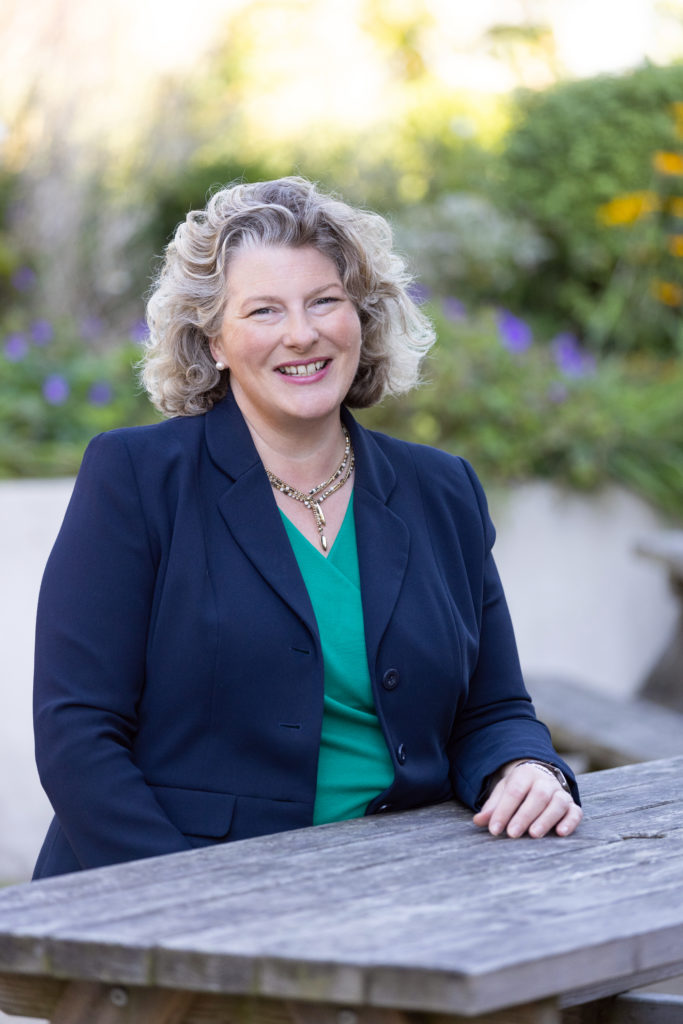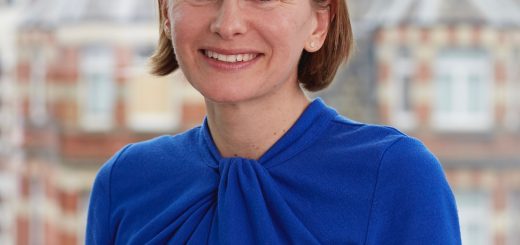Exclusive Interview with Mrs Lindsey Hughes, Headmistress of Channing.
INTRODUCTION:
From the outside, Channing School feels like a proper British school for girls. Nestled just off the road, it’s conveniently opposite to the Channing Junior School. Its grand exterior is satisfying. It’s what you climbed to the top of the hill to find. In the village of Highgate in North London the air feels fresh and on 24 June 2022 the trees are newly green. This combination is a welcome respite from the concrete bustle of Central London. Once inside the school doors there’s a very modern feel for an English day school established in 1885. It’s in the decor, the bright hallways and the head’s stylish office. Its jewel tones are also used by the head of the Junior School, but they’re more understated here. They grew up and are ready for the serious business of senior school.
Mrs Lindsey Hughes, the Headmistress of Channing since September 2020, greets me and offers a cup of tea. When I ask about her trajectory towards the headship at Channing she gives a slightly different story than other heads I’ve interviewed. In University, where she read history, she worked part-time for a PR company in the school holidays. When she finished Uni, she did PR for Virgin Megastores (remember them?). She loved it until she felt Richard Branson could get on ok without her. She then made a move into charity fundraising; something with a bit more depth. When she worked at the Sutton Trust she visited schools and attended meetings at the Department of Education. Here it was pointed out to her she might be on the wrong side of things. Perhaps what she should really do is teach. So, she began her PGCE and 20 years later she landed her first headship in the middle of a global pandemic.
“I like a project,” she says. That’s a good thing as she worked in an all-boys state school, helped an all-boys independent become co-ed and worked with all-girls. All this before she became Deputy Head of Lady Eleanor Holles School in Southwest London. To start as head of an all-girls senior school in North London just after lockdown felt like the next logical project. She needed to learn the ins and outs of the school quickly. Members of the school community felt in these extraordinary circumstances she couldn’t see the real Channing. However, in a stripped back version of the school, she saw nothing but. While bubbles and social distancing replaced extracurriculars, what she experienced was the support of the staff and warmth from the girls. She could see what she felt was the true Channing–they were thrilled to be back together.
Mrs Hughes attributes much of the school’s ethos to its Unitarianism which appeals to her. Her grandfather was a Unitarian, after all, something she learned by coincidence when she applied for the position. And what a coincidence, as Channing is one of only four Unitarian schools in the entire world. She explains, “Unitarianism says, all paths to faith are equal. and we all just have to get along with one another, in a practical, more secular, 21st century way.” As North London is home to many nationalities and faiths it’s worth noting all are welcome at Channing. “It means that we are really open to diversity,” she adds, “we are an inclusive school.”
This ethos spills over into the community. Combine it with a PR background and work in educational grant making, Mrs Hughes knows how to make Channing school more outward facing. She is also aware of what kind of outreach has a lasting impact. With the goal of long-term, sustainable partnerships in mind, Channing established educational relationships with a handful of schools in the area. Born out of a need to connect over lock down, boys from St Aloysius come up for Latin and Debate. Girls head there for DT. Summer enrichment programs are held for local primary age children through the Highgate Newtown Community Partners link. When I ask how Channing stands out in the bubble of North London where parents are spoiled for choice, points to this.
Another distinction is how the Unitarian ethos plays a large role in the academic strategy of the school. ‘Girls enjoying success’ is the school tag line and ‘ENJOYING’ is a stand out concept. She wants girls who arrive in Year 7 to relax and focus on the next seven years of learning, not performance. Mistakes should be celebrated as they aid in growth, and shouldn’t limit the girls with fear. She’d rather they be what she calls ‘Fearless Learners’ and asks them to be ‘10% Braver.’ It’s about empowerment in and out of the classroom. Conabor, or ‘I Shall Try,’ is their motto.
Mrs Hughes is adamant this kind of fearlessness can only be cultivated when the girls find themselves in difficult situations in the classroom. She doesn’t want them spoon fed. They can only stretch when they learn to sit with discomfort. This is where they come up with strategies to handle different situations. This approach can then move outside the classroom and be applied to all the curveballs life may throw their way. For example, how can they reach out to others if they don’t know how to deal with a certain situation? Be 10% Braver.
INTERVIEW:
1. This is your first headship and it started in September 2020 in the midst of a global pandemic. How do you feel that’s affected your time here at Channing so far?
Interestingly, people’s first reaction to hearing that I started as Headmistress at Channing during the pandemic is to commiserate with me – but I think it had some real positives! My first task was to reopen the Senior School after lockdown and welcome back all the staff and pupils. I learned a huge amount about the working of the school in a short space of time, forged really strong relationships with my senior team, and above all discovered the extraordinary spirit and resilience of the Channing community. Pupils and staff dealt with all the restrictions with such aplomb and made my first year in post a lot of fun, despite the challenges!
2. As you move forward in your tenure here at Channing, what do you hope to see in the future? Are there any short- or long-term changes you’d like to see implemented? If so, can you give us some examples?
One of the most noticeable developments taking place at Channing this year has been in how we as teachers have focused very explicitly on our own classroom practice: we are working hard on developing our pupils’ skills as Fearless Learners. Teachers report more engagement and more risk-taking in the classroom; pupils report that they understand how different questioning and feedback techniques are helping them become more independent and confident learners.
We also know that Channing’s reputation for sport and STEM is (not yet) as strong as it should be. There is plenty going on in both departments: my job is to ensure we develop these even further and shout about them a lot more!
3. With healthy competition for a spot at Channing (at 11 400+ girls vie for 55 places), do you have any thoughts on tutoring for the 11+?
Yes: please don’t do it! In my view tutoring has two serious distorting effects, both of which have a long-term impact on the wellbeing of students when they move into senior school. Firstly, tutoring coaches children who then achieve far more highly in the 11+ tests than they might have done naturally and are offered places in schools for which they are not academically suited. On arrival in these schools they don’t perform at the pace or standard required of the school and two further things happen – one, they are miserable because they are not achieving, they can feel stupid by comparison to their peers, and this can impact their self-esteem, self-confidence and mental health. Two, they then need more tutoring outside school (especially in the first few years) to feel able to get through the curriculum.
My second concern is that intensive tutoring places such a significant emphasis on the importance of the 11+ as a ‘do or die’ moment, where passing and failing are the only two possibilities, that it changes the child’s view of all testing from then on. At senior school we then spend 5 years undoing their fear of testing and fear of failure so that they are able to approach their public examinations at 16 and 18 with a sense of confidence and perspective.
4. About half of the girls who join at Year 7 go through the rigorous 11+ process. The other half come from the Junior School and haven’t spent their time preparing for exams. How do you balance out the curriculum and pace of learning for all the girls once they enter Year 7?
All our new Year 7s settle easily and quickly, although this can take different times for different girls. We ease them in gently at the start of Year 7 and our specialist and committed teachers get to know the students very quickly, working together to see what they’re great at and what they might need some help to become great at!
5. Can you tell us a bit more about STEM subjects offered at Channing? There is a wide variety of degree courses, but what does the future hold at Channing for more applied sciences and technology courses for the girls?
We offer all the subjects you might expect to see from a school like Channing, including Physics, Biology, Chemistry and Computing: in fact Maths is our most popular subject at A Level. All of this is underpinned by a range of STEM focussed co- and extracurricular activities such as Teen Tech in Year 9, where last year one of our teams won their category at the national finals, to DT, Robotics and Coding Clubs. We even have a Year 7 Dissection Club!
6. Channing offers subjects which are outside of the National Curriculum. Can you expand on this and tell us what subjects/clubs and other offerings you have in place outside of the curriculum?
Year 7 have a lesson of Philosophy every week as a standard part of our Channing curriculum.
All pupils in Year 7 also participate in an ‘Independent Investigation’ programme in which they work with pupils from across the year group to explore a number of different topics and develop their initiative, creativity and scholarship. This year’s projects included ‘Mathematical Origami and the Benefits of Micro-Exercises’, ‘Environmental issues’, ‘Languages, Countries, Culture’, a ‘Non-fiction Workshop’ and ‘Debating Skills’.
We also run a programme to really stretch our most able students, called the Ellery Programme. In the spring and summer, Year 7 pupils apply to join these selective after-school courses on a variety of different topics, such as archaeology, creative writing, the history of feminism, modular arithmetic, and sports science.
Further up the school, we offer two levels of the AQA Project Qualification, PQ2 in Years 10 & 11 and Extended Project Qualification in the Sixth Form, which allow pupils to research deeply into a topic of their own choice, produce a written report or artefact based on their findings and present to an audience of staff and pupils.
Our Sixth Form Enrichment programme sees pupils studying a whole host of topics from DJing, printmaking and reflexology, to Finance, making TED talks and Critical Thinking.
7. You’ve recently revamped your Drama facilities. Does the school intend to make its Drama offering a larger part of the curriculum? Does the school have inroads to LAMDA or RADA for girls who are seriously considering the performing arts in their future?
Drama is already a significant part of Channing life. Our students benefit from the relatively new Arundel Centre, a 248-seat professional standard theatre, which helps them learn all aspects of theatrical life, from performing to stage managing, lighting and sound. Year 8 and 9 students participate in the LAMDA course as part of our extra-curricular offer and regularly achieve merit and distinction in these exams.
Every year our A level students are successful in applications for drama school or for theatre-related courses. In the last few years this has included musical theatre, dance and musical theatre and set and costume design for theatre and performance.
8. Once in the sixth form, how are the girls supported with University admissions and interviews? How are they encouraged to choose fields of study they’d be most suited for?
You might be surprised to discover that our Careers programme starts in the Junior School! It really ramps up from Year 9 and by Year 11 all students have taken the Morrisby test, which offers suggestions of possible areas for further study. In Years 10 and 11 we introduce more information about the various paths beyond school, including studying in the USA and other overseas universities which is an increasingly popular choice.
The university entry process starts in Year 12 with UCAS presentations and the annual Springboard to the Future Fair and Presentation Day where Admissions Tutors, expert speakers and organisations come to the school so our students can learn first-hand about universities and other options available to them. Our mixed Year 12 and 13 tutor groups provide an opportunity for Year 12s to experience the university applications process closely and witness the preparation and decision-making. Our focus is very much on success as each girl defines it and all of our students are supported to find the course and place of study that suits them best whether that is university, degree apprenticeships, art foundation, conservatoire or a gap year.
The chosen destinations and courses of last year’s leavers alone demonstrate the diverse and eclectic interests and passions of Channing students: they include everything from Law, History and Classics through Economics, Languages and Business-related courses to Mathematics, Natural Sciences and Evolutionary Biology. We have girls going to study Psychology, Anthropology, Sociology and Criminology; Musical Theatre and Design for Theatre Performance; Ecology and Conservation and even Equine Business Management.
9. Is there a percentage of girls who end up studying abroad for University? If so, is there a structure in place to help these girls navigate the very different admission processes to Universities, let’s say in America?
More students are now considering studying in Europe, the USA, Canada and even further afield such as Australia. We are very successful in supporting these applications with specialist presentations, workshops and guidance on essays as well as completing applications, with an increasing number of students going on to study at a range of schools and colleges across the globe every year.
10. What policies do you have around mobile phone usage? Does the school get involved if any cases of cyberbullying do occur? If so, can you explain what strategies are in place?
Mobile phones are expected to be invisible, silent, and placed in students’ lockers during the school day. Everyone at Channing – students and staff – live by The Channing Promise and the iPromise. The Channing Promise requires us to treat everyone within the Channing community with respect and kindness and to think of others and be aware of their feelings. We try to create a positive and supportive environment where we have the freedom to act, think and be heard. We make the most of the opportunities we are given with a positive and appreciative attitude. And above all we treat all people fairly. Naturally we have a behaviour policy with rewards and sanctions and an anti-bullying policy, but we find that sanctions rarely need to be applied and if they do the behaviour tends not to be repeated.
11. What can you tell us about the mental health of the girls? What types of support are on offer for them?
Pastoral care is a focus for everyone at Channing and one of our greatest strengths is our strong school community and our ethos of looking after each other. We have specific systems to embed our pastoral values such as a Big Siblings programme where each Year 7 has a Year 8 student assigned to them as a pastoral mentor; a sixth form mentoring system; two school nurses who are also mental health first aiders; a school counsellor; our House system which brings students from different year groups together into a House family; an outstanding PSHE program which tackles contemporary issues that all teenagers are likely to face; and we also discuss a thought for the term which has a pastoral focus and provide key pastoral messages in our weekly assemblies. Our two Head Girls are also focusing on mental health and well-being as part of their chosen priorities for this year.
12. What programs are in place for girls with special needs? Is there any support for more gifted students?
We recognise and celebrate diversity in our student body: those who are exceptionally able, those who have specific learning differences, those who have short or long term physical difficulties and those for whom English is an additional language. We have a full-time Special Educational Needs Co-ordinator and two Learning Support Specialist Teachers who work hard to ensure that all our pupils can fulfil their potential in a supportive, yet purposeful environment. Students are encouraged to consult their teachers about any difficulties they encounter, and we promote flexibility in supporting individual girls who are experiencing difficulties.
13. Can you explain the ‘ethos’ of Channing Senior School to us? What does it offer the girls during their time at the school that sets them apart once in University?
For Channing, the words ‘Girls Enjoying Success’ are so much more than a mere strapline; they are the shorthand for the unique educational philosophy that we offer. We are definitely not what you might expect from a North London independent girls’ school! Our Unitarian values of free thinking, acceptance and inclusivity mean that every member of the school is valued: our students are personally ambitious but mutually supportive. We are a school for all faiths and none, open to ideas, able to engage critically with them and active in society and interested in the world. I have never worked in a school with such a strong sense of social justice: we have a FemSoc, Rainbow Soc, Amnesty Soc, environmental campaigns, and so much more. Our students leave us as confident, brave, self-aware young women, ready to lead from the front, confront injustice, spread kindness and joy, and take up their place in the world. I couldn’t be prouder of them.
Conclusion:
The architecture of Channing Senior School is a mixture of old and new. The rambling hallways and staircases make it feel cozy, and at the same time airy and spacious. The classrooms are as sophisticated as any in North London, yet feel personal and full of the presence of the girls. It was A Level time and the art on display was impressive, not just the sheer volume, but in the skill involved to produce it. The girls have fantastic art studios with some of the best views of London, so that must help a little!
The state of the art theatre is a recent addition to the school. It is a spectacular space equipped with everything the girls need for drama, assembly or academic presentations. The library is most impressive with inviting spots for the girls to nestle down with a good book. There are also rooms equipped with more hard edged furniture conducive to quiet study sessions. Channing isn’t really known for its sport, but as Mrs Hughes noted, she loves a project. Who knows what changes she may implement during her tenure.
Mrs Hughes sums it up, “There is none of that sharp elbowed competition here,” she says, “which could characterise academic success or pressure in other schools. The girls are really mutually supportive. And yes, they’re ambitious. Yes, they’re competitive, but it is not at the expense of one another.” She truly believes fantastic outcomes for every child are within her grasp without it having to be at all costs. Combine this with a moral compass of inclusion for the 21st Century and Channing is not a school to be overlooked.











